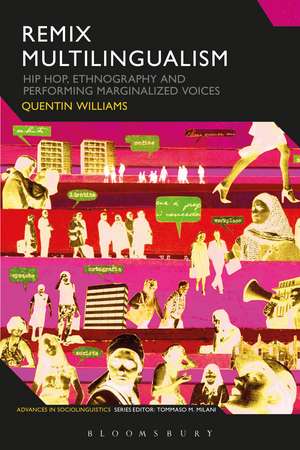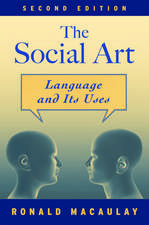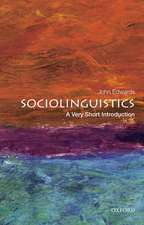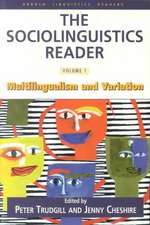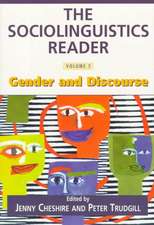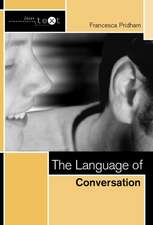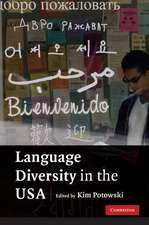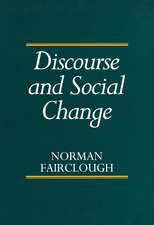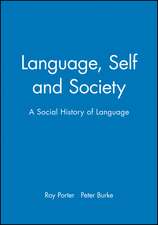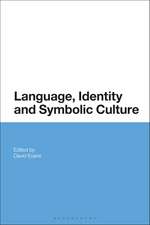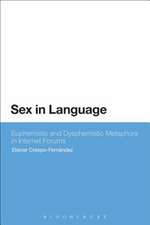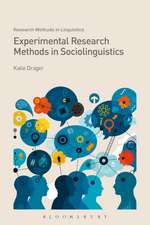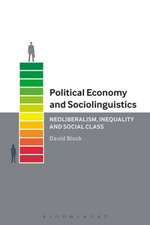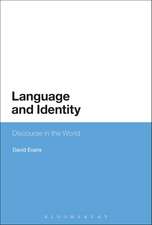Remix Multilingualism: Hip Hop, Ethnography and Performing Marginalized Voices: Advances in Sociolinguistics
Autor Dr Quentin Williamsen Limba Engleză Hardback – 20 sep 2017
| Toate formatele și edițiile | Preț | Express |
|---|---|---|
| Paperback (1) | 231.34 lei 6-8 săpt. | +85.58 lei 6-12 zile |
| Bloomsbury Publishing – 20 mar 2019 | 231.34 lei 6-8 săpt. | +85.58 lei 6-12 zile |
| Hardback (1) | 773.81 lei 6-8 săpt. | |
| Bloomsbury Publishing – 20 sep 2017 | 773.81 lei 6-8 săpt. |
Din seria Advances in Sociolinguistics
- 30%
 Preț: 569.45 lei
Preț: 569.45 lei - 8%
 Preț: 301.09 lei
Preț: 301.09 lei -
 Preț: 193.14 lei
Preț: 193.14 lei - 43%
 Preț: 634.71 lei
Preț: 634.71 lei - 13%
 Preț: 257.41 lei
Preț: 257.41 lei - 23%
 Preț: 190.41 lei
Preț: 190.41 lei - 26%
 Preț: 265.10 lei
Preț: 265.10 lei - 22%
 Preț: 259.34 lei
Preț: 259.34 lei - 22%
 Preț: 231.34 lei
Preț: 231.34 lei -
 Preț: 257.41 lei
Preț: 257.41 lei - 23%
 Preț: 198.30 lei
Preț: 198.30 lei - 22%
 Preț: 224.48 lei
Preț: 224.48 lei - 14%
 Preț: 1066.97 lei
Preț: 1066.97 lei -
 Preț: 258.15 lei
Preț: 258.15 lei - 22%
 Preț: 260.43 lei
Preț: 260.43 lei - 13%
 Preț: 256.20 lei
Preț: 256.20 lei -
 Preț: 257.50 lei
Preț: 257.50 lei - 22%
 Preț: 230.79 lei
Preț: 230.79 lei -
 Preț: 217.07 lei
Preț: 217.07 lei - 23%
 Preț: 222.19 lei
Preț: 222.19 lei - 23%
 Preț: 197.05 lei
Preț: 197.05 lei - 24%
 Preț: 375.17 lei
Preț: 375.17 lei - 31%
 Preț: 1067.52 lei
Preț: 1067.52 lei - 13%
 Preț: 258.42 lei
Preț: 258.42 lei -
 Preț: 258.59 lei
Preț: 258.59 lei - 19%
 Preț: 467.50 lei
Preț: 467.50 lei - 9%
 Preț: 296.91 lei
Preț: 296.91 lei - 30%
 Preț: 775.83 lei
Preț: 775.83 lei - 13%
 Preț: 258.42 lei
Preț: 258.42 lei
Preț: 773.81 lei
Preț vechi: 1112.93 lei
-30% Nou
Puncte Express: 1161
Preț estimativ în valută:
148.07€ • 154.91$ • 123.00£
148.07€ • 154.91$ • 123.00£
Carte tipărită la comandă
Livrare economică 03-17 aprilie
Preluare comenzi: 021 569.72.76
Specificații
ISBN-13: 9781472591111
ISBN-10: 1472591119
Pagini: 264
Dimensiuni: 156 x 234 x 19 mm
Greutate: 0.52 kg
Editura: Bloomsbury Publishing
Colecția Bloomsbury Academic
Seria Advances in Sociolinguistics
Locul publicării:London, United Kingdom
ISBN-10: 1472591119
Pagini: 264
Dimensiuni: 156 x 234 x 19 mm
Greutate: 0.52 kg
Editura: Bloomsbury Publishing
Colecția Bloomsbury Academic
Seria Advances in Sociolinguistics
Locul publicării:London, United Kingdom
Caracteristici
Furthers scholarship on the nature of language: how is multilingualism practiced and performed by different young and marginalised social actors such as hip hop language speakers
Notă biografică
Quentin Williams is a Senior Lecturer in the Linguistics Department at the University of the Western Cape, South Africa, and also a Research Fellow in the Centre for Multilingualism and Diversities Research (CMDR) at the same university.
Cuprins
Foreword: Dit. Is. Die. Remix: Remixing Multilingualism Straight Outta Cape Town by H. Samy AlimPrefaceAcknowledgments 1. Introduction: Remixing Multilingualism in a Globalized World 2. Designing Hip Hop Sociolinguistics 3. The Hip Hop Sociolinguist and Multi-sited Ethnography: Collecting Multilingual Remix Data4. Multilingual Emcees up in the Club and Other Spaces5. Multilingual Braggadocio and Intertextuality6. Multilingual Freestyle Rap and Performing Locality7. Staging Masculinity: Emceeing Toughness, Toughing up the Emcee 8. Precarious Femininity: The Performativity of Sexualized Bodies9. Conclusion: On the Future Study of Marginalized Voices DiscographyBibliographyIndex
Recenzii
Williams' book is a state-of-the-art document of the current scholarly interest in the sociolinguistics of global hip hop ... An important case study for students of language, culture and society.
Quentin Williams both broadens and connects two major areas of research: the sociolinguistics of multilingualism and hip hop studies ... Remix Multilingualism provides deep insights into the local Cape hip hop scene while demonstrating its important relationship with global hip hop.
Highly recommended.
Hip Hop messes up with language, it takes it to a whole nother level, where the poetic is mixed with the political, where the global and the local meet in a space of métissage, and where the familiar is so worked-on that it becomes unfamiliar. Grounded in the multilingual, the ethnographic and the marginalized, Remix Multilingualism shows us the power of (Global) Hip Hop (Language) and why we need to have our ears to the ground and hear it. WORD!
Remix Multilingualism is the book we've been waiting for ever since 1994 when the 'new' South Africa enshrined its eleven official languages policy in the Constitution. Williams' clear, scholarly vision and rigorous, ethnographic labor in the Hip Hop vineyards of Kuilsriver have yielded a master text which demonstrates the rich multilingualism of marginalized voices in South Africa (and by extension, elsewhere in the Global South). It is a major contribution to the fields of Hip Hop studies and Multilingualism and a must-read for scholars and teachers alike.
An exciting and rich multi-sited linguistic ethnography of marginality in the South and its multilingual (re)mediation. Quentin Williams has (re)mixed a tantalizing recipe for understanding how lives and selves may be materialized in and through Linguistic Citizenship.
This is a dope book. Quentin Williams - this Kaalvoet Laaitie vannie Lavis - nails the ways Hip Hop is a driving force in remixing multilingualism, doen your ding, shifting the raciolinguistic politics of multilingualism. This vital book is not only about remixing linguistic resources in South Africa but about remixing how we think about multilingualism. Read it and remix.
Remix Multilingualism takes readers into the heart of Cape Hip Hop's rich multilingual politics in a detailed ethnographic study that lays the groundwork for rethinking hegemonic understandings of' 'race', 'gender' and identity politics. The strength of Williams' work is that it pushes debates about 'coloured' and 'black' identities, as well as linguistic performances of these identities beyond the confines of what the academe has considered worthy of academic study in the South African context and beyond apartheid-era thinking about 'race', which endears in a country that remains racially divided.
Quentin Williams both broadens and connects two major areas of research: the sociolinguistics of multilingualism and hip hop studies ... Remix Multilingualism provides deep insights into the local Cape hip hop scene while demonstrating its important relationship with global hip hop.
Highly recommended.
Hip Hop messes up with language, it takes it to a whole nother level, where the poetic is mixed with the political, where the global and the local meet in a space of métissage, and where the familiar is so worked-on that it becomes unfamiliar. Grounded in the multilingual, the ethnographic and the marginalized, Remix Multilingualism shows us the power of (Global) Hip Hop (Language) and why we need to have our ears to the ground and hear it. WORD!
Remix Multilingualism is the book we've been waiting for ever since 1994 when the 'new' South Africa enshrined its eleven official languages policy in the Constitution. Williams' clear, scholarly vision and rigorous, ethnographic labor in the Hip Hop vineyards of Kuilsriver have yielded a master text which demonstrates the rich multilingualism of marginalized voices in South Africa (and by extension, elsewhere in the Global South). It is a major contribution to the fields of Hip Hop studies and Multilingualism and a must-read for scholars and teachers alike.
An exciting and rich multi-sited linguistic ethnography of marginality in the South and its multilingual (re)mediation. Quentin Williams has (re)mixed a tantalizing recipe for understanding how lives and selves may be materialized in and through Linguistic Citizenship.
This is a dope book. Quentin Williams - this Kaalvoet Laaitie vannie Lavis - nails the ways Hip Hop is a driving force in remixing multilingualism, doen your ding, shifting the raciolinguistic politics of multilingualism. This vital book is not only about remixing linguistic resources in South Africa but about remixing how we think about multilingualism. Read it and remix.
Remix Multilingualism takes readers into the heart of Cape Hip Hop's rich multilingual politics in a detailed ethnographic study that lays the groundwork for rethinking hegemonic understandings of' 'race', 'gender' and identity politics. The strength of Williams' work is that it pushes debates about 'coloured' and 'black' identities, as well as linguistic performances of these identities beyond the confines of what the academe has considered worthy of academic study in the South African context and beyond apartheid-era thinking about 'race', which endears in a country that remains racially divided.
